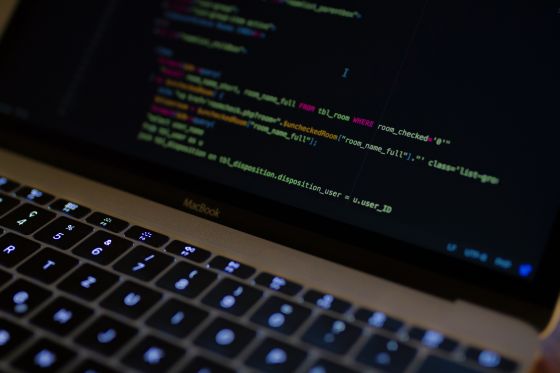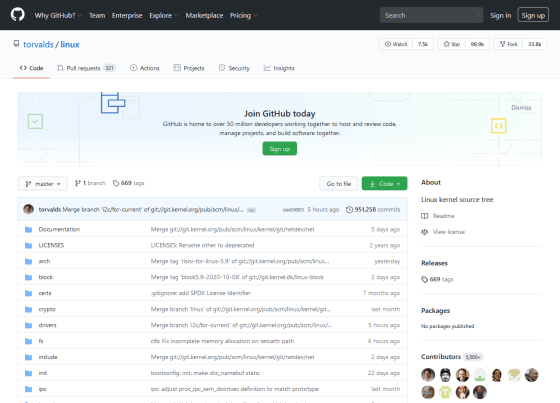The moment of the birth of 'Linux' looking back on the email of Linus Torvalds, the creator of Linux

by
One of the most successful projects in the open source community, Linux is an operating system developed by Linus Torvalds , a student at the University of Helsinki in 1991, which also supports web servers, smartphones, and IoT devices. It is an indispensable existence in modern times. Alan W Black , a professor at Carnegie Mellon University , has published a description of Mr. Torvalds looking back on 'the beginning of Linux' based on the email at that time.
LINUX's History by Linus Torvalds
https://www.cs.cmu.edu/~awb/linux.history.html
On July 3, 1991, Torvalds appeared in the USENET MINIX namespace, professing the development of a new operating system and asking MINIX users to debug their programs.
From: [email protected] (Linus Benedict Torvalds)
Newsgroups: comp.os.minix
Subject: Gcc-1.40 and a posix-question
Message-ID:
Date: 3 Jul 91 10:00:50 GMT
Hello, net of everyone
I'm working (at MINIX) for a project and am interested in the POSIX standard. Can anyone please tell me the latest machine-readable POSIX rules? FTP sites are preferred.
'A project' that appears in the email is exactly Linux, and Torvalds commented that July 3, 1991 was the time when he started thinking about implementing Linux at the user level. At that time, some device drivers were completed, and the hard disk was in the stage of working.
In addition, Torvalds, who had just learned about
PS. I installed 'changing.plan' that I made, but I'm not sure if it works in overseas environment. Would you please check the operation of someone overseas? changing.plan will output a new '.plan' every time.
About two months after this email, on August 25, 1991, Linux version 0.01 was released, but it didn't actually work, Torvalds said. 0.01 was a kind of gesture to show that development is progressing to those who are tired of waiting for the completion of Linux. The following is an excerpt from an email sent by Torvalds a few weeks before the release of version 0.01.
From: [email protected] (Linus Benedict Torvalds)
Newsgroups: comp.os.minix
Subject: What would you like to see most in minix?
Summary: small poll for my new operating system
Message-ID:
Date: 25 Aug 91 20:57:08 GMT
Organization: University of Helsinki
You who are using the MINIX, Hello
I'm developing a (free) operating system (a hobby-level one that isn't as big and professional as GNU ) for AT-386 compatibles. We started preparations in April, but we are finally ready for the release. My OS has some similarities to MINIX (especially the physical layout of the file system is the same for practical reasons), so I would like feedback on what I like and dislike about MINIX.
We are currently porting Bash 1.08 and GCC 1.40 and have confirmed the operation. This means that a working OS will be ready within a few months, and I want to know what features many people want. Any feature suggestions are welcome, but I can't promise to actually implement them :-)
Torvalds released Linux version 0.01 in mid-September, answering technical questions from mailing list members such as 'Do you need a memory management unit ?' And 'How much does it consist of C?' That thing. However, I was not confident in version 0.01, so I released only the source code for those who are interested without notice of release.
And on October 5, 1991, about two months after the release of version 0.01, Linux version 0.02 was released.
From: [email protected] (Linus Benedict Torvalds)
Newsgroups: comp.os.minix
Subject: Free minix-like kernel sources for 386-AT
Message-ID:
Date: 5 Oct 91 05:41:06 GMT
Organization: University of Helsinki
Do you miss MINIX 1.1, where you wrote your own device driver? Don't you have a good project and want to struggle with an OS that you can change to suit your needs? Are you frustrated that everything works with MINIX? Do you ever stay up all night to get a nifty program running? If so, this post is for you :-)
As I mentioned about a month ago, I'm working on an OS like the free version of MINIX for AT-386 compatibles. We've finally reached a practical stage (which may not meet what you're looking for), and we're planning to make the source code publicly available. The version is only 0.02 (a small patch is ready to upgrade one version), but it works fine with Bash, GCC,
The source code is located in the '/ pub / OS / Linux' directory on the nic.funet.fi (128.214.6.100) server. There are some README files in the directory and some binaries running on Linux (bash, update, gcc, etc.). The complete kernel source code is provided without using the MINIX code. Some of the library source code is charged, so some are not currently included in Linux. The binary source code is in '/ pub / gnu'.
Omission
You will hear the voice, 'Why did you develop Linux?' GNU Hurd will be released, and MINIX is already available. This is a program for hackers by hackers. I enjoy this program, and others may enjoy it by touching it or changing it to their liking. Linux is still a small program that you can understand, use, and change. That's why we welcome your comments.
I'm interested in the opinions of those who have written minix utilities and libraries. If your efforts can be shared (copyrighted or in the public domain ), you can listen and incorporate them into Linux. I'm currently using Earl Chews estdio (great system, thanks to Earl) and co-developers are welcome. Of course your copyright is protected. If you would like me to use your code, please contact me.
Torvalds commented on Linux at this point, 'I was wondering if it could be called a system, but it worked fine and some people tried it.' There were some serious bugs, and 0.02 wasn't really practical.
Released a few weeks after 0.02, 0.03 was practical, Torvalds said. 0.11 now supports demand loading, console beeps, and disk manipulation commands such as mkfs and fsck that are commonly used in modern Linux. One year after the release of 0.01, the development was so active that the version reached 0.9 units. As of 2020, 29 years after Linux development began, GitHub has more than 1 million commits, making it the largest project in the open source community.
In August 2020, the Linux Foundation , which supports the open source community such as Linux, published the 'Linux Kernel History Report', which looks back on the 29-year history of Linux, and can be downloaded from the following URL.
Download the 2020 Linux Kernel History Report --The Linux Foundation
https://www.linuxfoundation.org/blog/2020/08/download-the-2020-linux-kernel-history-report/
Related Posts:
in Software, Posted by darkhorse_log







